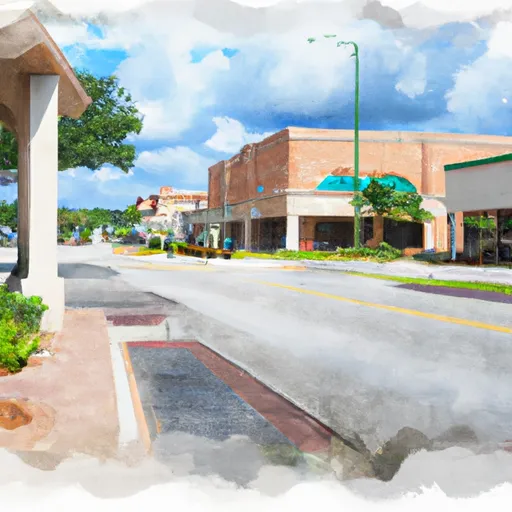-
 Snoflo Premium
Snoflo Premium
Get unlimited access to all our content
With no Ad interruptions! - Start Your Free Trial Login with existing account
Mc-Alpin
Eden Index
Climate
7.5
•
Recreation
3.5
•
Community
•
Safeguard
4.2/10

McAlpin, Florida is a small unincorporated community located in Suwannee County. Situated in the northern part of the state, McAlpin experiences a humid subtropical climate characterized by long, hot summers and mild winters. Summers are typically hot and humid, with temperatures averaging in the mid to high 90s Fahrenheit (mid 30s Celsius). Winters are generally mild, with temperatures averaging in the 60s Fahrenheit (15-20 degrees Celsius).
Hydrologically, McAlpin is part of the Suwannee River Basin, known for its pristine rivers, springs, and abundant groundwater. The water quality in the region is outstanding, with crystal-clear springs and diverse aquatic life. The Suwannee River and its surrounding tributaries offer plenty of opportunities for outdoor enthusiasts, including fishing, boating, and canoeing/kayaking.
Moreover, McAlpin is close to numerous outdoor recreational areas. The nearby Suwannee River State Park provides opportunities for camping, hiking, picnicking, and wildlife viewing. Additionally, the Suwannee River Wilderness Trail offers paddlers a chance to explore the river's natural beauty and experience the serene surroundings.
Overall, McAlpin, Florida offers a favorable climate, abundant water resources, and various outdoor recreation opportunities, making it an appealing destination for nature lovers and outdoor enthusiasts.
What is the Eden Index?
The Snoflo Eden Index serves as a comprehensive rating system for regions, evaluating their desirability through a holistic assessment of climate health, outdoor recreation opportunities, and natural disaster risk, acknowledging the profound impact of these factors on livability and well-being.
Climate Health Indicator (CHI): 7.5
Mc-Alpin receives approximately
1355mm of rain per year,
with humidity levels near 89%
and air temperatures averaging around
21°C.
Mc-Alpin has a plant hardyness factor of
8, meaning
plants and agriculture in this region tend to thrive here all year round.
By considering the ideal temperature range, reliable water supplies, clean air, and stable seasonal rain or snowpacks, the Climate Health Indicator (CHI) underscores the significance of a healthy climate as the foundation for quality living.
A healthy climate is paramount for ensuring a high quality of life and livability in a region, fostering both physical well-being and environmental harmony. This can be characterized by ideal temperatures, reliable access to water supplies, clean air, and consistent seasonal rain or snowpacks.
Weather Forecast
Streamflow Conditions
Suwannee
Area Rivers
Suwannee
Snowpack Depths
Suwannee
Reservoir Storage Capacity
Suwannee
Groundwater Levels
Recreational Opportunity Index (ROI): 3.5
The Recreational Opportunity Index (ROI) recognizes the value of outdoor recreational options, such as parks, hiking trails, camping sites, and fishing spots, while acknowledging that climate plays a pivotal role in ensuring the comfort and consistency of these experiences.
Access to outdoor recreational opportunities, encompassing activities such as parks, hiking, camping, and fishing, is crucial for overall well-being, and the climate plays a pivotal role in enabling and enhancing these experiences, ensuring that individuals can engage in nature-based activities comfortably and consistently.
Camping Areas
| Campground | Campsites | Reservations | Toilets | Showers | Elevation |
|---|---|---|---|---|---|
| Gornto Springs County Park | 24 | 20 ft | |||
| Shired Creek County Park | None | 11 ft | |||
| Ben Hill Landing County Park | None | 161 ft | |||
| Manatee Springs State Park | None | 25 ft | |||
| Shell Mound County Park | None | 7 ft | |||
| Hinton Landing County Park | None | 19 ft | |||
| Gibson | None | 65 ft | |||
| Hart Springs | None | 13 ft | |||
| Suwannee River State Park | None | 74 ft | |||
| Otter Springs County Park | 100 | 19 ft |
Nearby Fishing
Catastrophe Safeguard Index (CSI):
The Catastrophe Safeguard Index (CSI) recognizes that natural disaster risk, encompassing floods, fires, hurricanes, and tornadoes, can drastically affect safety and the overall appeal of an area.
The level of natural disaster risk in a region significantly affects safety and the overall livability, with climate change amplifying these risks by potentially increasing the frequency and intensity of events like floods, fires, hurricanes, and tornadoes, thereby posing substantial challenges to community resilience and well-being.
Community Resilience Indicator (CRI):
The Community Resilience Indicator (CRI) recognizes that education, healthcare, and socioeconomics are crucial to the well-being of a region. The CRI acknowledges the profound impact of these elements on residents' overall quality of life. By evaluating educational resources, healthcare accessibility, and economic inclusivity, the index captures the essential aspects that contribute to a thriving community, fostering resident satisfaction, equity, and social cohesion.

